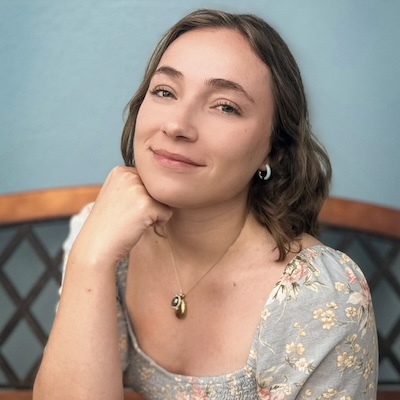
Taylor Ebersole
Contest - Flash Fiction
Taylor Ebersole lives in Norfolk, Virginia. She is pursuing her MFA in Creative Writing at Old Dominion University, where she works as a reader for Barely South Review. Her fiction has appeared in RiverCraft and is forthcoming in Allium, A Journal of Poetry & Prose and Constellate.
Once, Our Overpass
When Dad takes us to the overpass construction site for the first time, He tells us to entertain ourselves. Don’t eat anything we find in the foliage. Don’t talk to strangers. He’ll be back soon to take us for dinner. He gets us confused, as always, and tells us He loves us by the wrong names, then disappears onto the skywalk. It’s only natural that we sit in the overpass’s shade, digging in cool mud, shuffling through the leaves of fallen oaks once in the way of the new construction. Far above, the gunfire of a jackhammer rains from the clouds. Like Dad, we need to stay busy.
We start our own construction immediately, packing mud into a dome small as our fists combined. It’s a squat home, but better than nothing. We stay till the lightning bugs come out, blinking synchronously. When Dad returns, His neon vest haloed in the industrial lights behind Him, we kiss the mosquito bites and fresh bruises down His forearms.
“When I was little,” Dad said, “this was just a field. A shame.” There are smears of oil on His hands, His forearms, and just beneath His chin. He’s broad-shouldered, bigger in the dark, so it’s off-putting when He smiles. We always forget the softness of His eyes, His jaw, until it appears, then leaves again so suddenly we think we imagined it. But it doesn’t disappear this time. He points, whistling. “Look.” A rabbit watches us from the tall grass, so still as Dad approaches that she must be fake, but she attempts to escape just as His hand comes down on her back. He lifts her by her fur, cradling her. She struggles only for a moment, then settles, nose twitching as if to smell the salt off Dad’s sweat. When we pet her, her heartbeat echoes in our fingertips, our veins. We name her Cookie Dough.
The next day, our muddy house is gone with the rain. But, like Dad, we’re tough. We begin again, stripping bark from the felled trees to shape logs. Our town, as any, begins with mud and wood. We install a chimney when Dad flicks His half-burnt cigarette stubs to the side before disappearing into the sky. The day after, we install a popsicle-stick fence, blood-pink from when we sucked and gnawed the wood to get out all the cherry juice. We use aluminum foil for windows that reflect the black bottom of the overpass like a night sky. When the lightning bugs come back, they blink like stars. We fall asleep before we realize Dad didn’t come back, but that’s okay. Like Dad, we’re resourceful. We find branches for a fire when the temperature drops, and huddle close.
More. We build more. Throw down streets and homes. Abduct toads from the mud as our residents. Like Dad, we stay so busy we hardly notice the ache in our empty stomachs. No time to be hungry. We must be ready for His homecoming. Our city grows taller, enough so He can’t miss us in the overgrown grass.
The next morning, Cookie Dough returns to us, camouflaged in the brown grass. A sign from Dad that we're not alone. And then we’re hungry no longer.
When the streetlights on the overpass go up, the lightning bugs grow fewer, but that’s okay. How else would we see without light? The overpass shields us during the first snowfall, the spring rain, and the summer sun burning perfect, butter yellow over the field. We’re not upset when the toads leave for wetter grounds. We’ll find new inhabitants for our city, better inhabitants, inhabitants suited for this new land. Like Dad, we’re not afraid of setbacks. Like Dad, we’ll do better: think bigger. We lie in the grass to plan for His return; we search the black overpass for blinking stars, though we know they’re not coming back, diminished as they are by our city’s lights.
“ This story began from a prompt in a revision class meant to expand on a work-in-progress, but the scene I outlined never fit into my larger work. That class was about recycling writing instead of abandoning it. Though this flash developed from a story about two abandoned children, it became instead an origin story. ”
